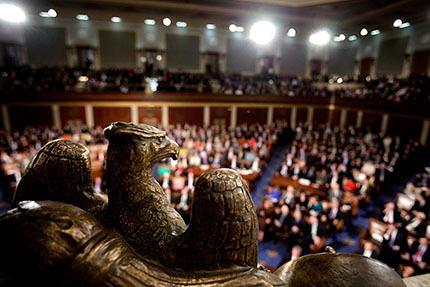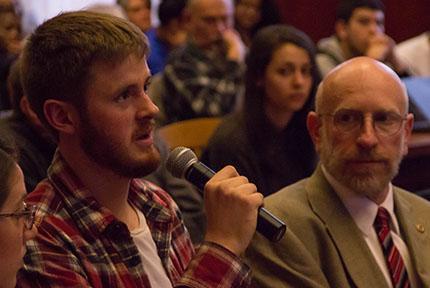
A Fragile Pedestal—How Strong is Our Commitment to Democracy?
A Response to Martha Nussbaum

Martha Nussbaum’s 2010 book, Not for Profit: Why Democracy Needs the Humanities, describes an unfolding crisis in education that threatens to undermine the practical conditions for functioning democratic institutions, both nationally and globally. More specifically, the book highlights a disturbing global trend toward devaluing and defunding education in the arts and humanities, in favor of more narrowly instrumental and vocational subjects such as the STEM fields—despite the compelling case that education in the liberal arts is essential to the cultivation of citizens capable of meaningful, political participation and effective self-governance.
As a philosopher who writes extensively on the subject of how contemporary techno-scientific cultures can continue to cultivate the moral and civic virtues essential to human flourishing, I happen to share many of Nussbaum’s philosophical commitments. Like Nussbaum and many before her, at least as far back as Aristotle, I believe that democratic citizens are not born but must be made. Democracy requires the widespread exercise of specific human capabilities that must be nourished, encouraged, and refined through a variety of cultural practices, of which educational institutions are a primary example. I share Nussbaum’s alarm at the global trend toward shortsighted educational policies that ignore the need to cultivate effective citizens, and seek only to train more efficient producers and consumers.
Unfortunately, Nussbaum’s argument in Not for Profit relies heavily upon a critical premise stated as a bland truism—a trivial claim that can be assumed without argument or supporting evidence. Yet this premise is so far from being a trivial truth that I fear that it may not be true at all. Worse still, if this claim is not true, then much of Nussbaum’s argument for educational policy reform is placed in jeopardy. The key claim is stated at the end of chapter one, “The Silent Crisis:” “Most of us would not choose to live in a prosperous nation that had ceased to be democratic.” From this premise, combined with other, very compelling premises concerning the link between the liberal arts and the cultivation of democratic capabilities, she draws the conclusion that declining public support for liberal arts education is an undesirable, even dangerous trend that must be reversed. But this conclusion only follows if it is true that this trend conflicts with a standing desire to enjoy, above other goods, including prosperity, a democratic way of life. But do ‘most of us’ still have this standing desire, as Nussbaum assumes? Or is this pedestal of the project of education for democratic character more fragile than we realize?
First we must ask, who is the ‘us’ to whom her claim is addressed? If Nussbaum is addressing educated readers in democratic, mostly Western nations, that should make her claim more plausible than if her claim were addressing all of humankind. After all, for citizens of a country like the United States, in which democratic principles and values are deeply entrenched in our founding documents and woven into our national narrative, it is easy to read past the claim without taking pause. Of course we would not surrender our democracy for mere prosperity. I myself would be greatly relieved to discover that her claim was true, even if its scope were limited to citizens of democratic nations. Yet my intuition is that the truth of this claim is actually very much in question, even and perhaps most of all for citizens of ostensibly democratic nations, and that the very educational trends that Nussbaum calls out as problematic for democratic societies are indicative of the claim’s possible falsehood.
As an initial test of this intuition, I presented the claim to my freshmen honors students at Santa Clara University, who are currently working through the political philosophies of Hobbes, Locke, and Rousseau, and are therefore well-primed to reflect on the depth of their own philosophical commitments to democratic values. Upon first consideration, they thought the claim unproblematic. Then I drew their attention to its implications—‘So, if given a choice between a prosperous society in which you enjoyed material comfort, perhaps even luxury, but lacked the right or power of self-governance, and a society that was manifestly less prosperous, but robustly democratic, you would certainly prefer the latter?’ At this point things exploded into controversy and questioning.
Some had not considered that democracy and prosperity could pull apart, and proposed that democracy was valuable simply because it was the most reliable road to prosperity. Yet, recent sharp rises in the prosperity of undemocratic nations, such as China, undermined this merely instrumental defense of democracy
One student observed, “Well, it’s not like our society is truly democratic anyway—I don’t believe that I have any real political power to influence elections or laws, so .... I’m not sure what I would really be losing.” Others noted the widespread disinterest of Americans in voting and other forms of active political participation, especially in years where economic prosperity and growth does not seem to hang in the balance. Nor were they sure how much they would value living in a ‘real’ democracy, despite the fact that we spent weeks discussing the more direct democracy of Athens, and Aristotle’s definition of a citizen proper as an agent of full political participation. Though many were clearly disturbed by the discussion’s implications, these students’ own intuitions called into serious question Nussbaum’s assumption of a stable and widespread commitment to democratic ideals, even among educated, highly intelligent, and comparatively privileged young citizens.
Democracy requires the widespread exercise of specific human capabilities that must be nourished, encouraged, and refined through a variety of cultural practices, of which educational institutions are a primary example.
Perhaps newly minted citizens cannot be expected to reliably embrace or defend democratic ideals. After all, these students are only now being introduced to the very form of higher education that Nussbaum believes so conducive to the maturation of their democratic capabilities. But later conversations with friends, relatives, and colleagues, most highly educated, did little to assuage my worry that, far from ‘most of us’ having an unassailable and articulate commitment to democracy, most of ‘us’ may in fact be able to say little about why democracy matters more than prosperity.
Rare were the responses I most expected: Enlightenment-style appeals to the accordance of self-rule with human dignity, or to the public use of one’s own reason as a condition of moral and intellectual maturity and courage. No one spoke of the civic responsibilities of self-governance engendered by our democratic liberties. I suspect that to say such things with robust sincerity in our post-Enlightenment era would seem quaint, even unsophisticated to many. If these conversations have any bearing upon Nussbaum’s claim (and given the entirely unscientific sample, they may not), then the voices of Rousseau, Kant, Locke, Mill, and even Rawls, are little more than muted whispers in many ears, and no other impassioned defense of democratic ideals waits on the tip of our tongues. Perhaps this stands as an indictment of our traditional way of teaching these ideals—even in the liberal arts.

If so, then our educational policies and priorities cannot be turned back to the path of democracy-building simply by pointing out that we are now veering away from it. Indeed, those who are pushing the most egregious programs of educational ‘reform’ away from the liberal arts (while decimating legal protections for voting rights and other conditions of political participation) are plausibly counting on these new educational trends weakening whatever thin public allegiance remains to robust democratic values— values that, in Nussbaum’s words, not only “lead to cultures of equality and respect” but produce thoughtful, engaged (and demanding!) citizens rather than mere “useful profit-makers.” To bring our systems of education back to building the democracies we used to cherish, perhaps we must first ask, “how do we bring ourselves back to cherishing democracy?”
Shannon Vallor is an Associate Professor and Chair of the Department of Philosophy at Santa Clara University. Her research and teaching focus on the philosophy of science and technology; her forthcoming book, 21st Century Virtue, explores the implications of emerging technologies for human flourishing, moral cultivation and virtue. She is a Scholar of SCU’s Markkula Center for Applied Ethics and Vice-President and President-Elect of the international Society for Philosophy and Technology.
Endnotes
- Martha Nussbaum, Not for Profit: Why Democracy Needs the Humanities (Princeton: Princeton University Press, 2010), 10-11.

